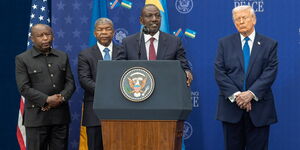A Chinese man has been the face of change in Kenya’s wildlife conservation efforts by turning his efforts into an avenue of employment as well as promoting a peaceful co-existence between the wildlife and local communities living deep within the country’s natural ecosystem.
Zhuo Qiang, who operates in the Maasai Mara game reserve, came to the country in 2004 as a tourist and since then, Kenya has been his second home following a deep-rooted passion for the preservation of endangered Kenya’s wild species.
The foreigner revealed that when he arrived, the situation was dire with less than 400 lions remaining in the reserve. That was when he embarked on a mission to put in place a more community-involved approach to saving the environment.
His efforts, he revealed, have helped reduce the human-wildlife conflict that threatened the existence of wild species such as lions. To help achieve this, Qiang employed rangers who live within the game reserve who patrol the vast ecosystem of Maasai Mara.
‘’Every day I patrol twice, once in the morning and in the afternoon. I patrol by foot and by car. The rangers here, their work involves patrolling the park and its borders to check on any instances of encroachment, or poaching,’’ he noted
The conservationist noted during the interview with the media that part of his success was attributed to more community involvement and approach in a bid to help the community understand the importance of a peaceful co-existence with wildlife.
‘’They also visit the local communities to help promote harmony between the people and the wild animals. Last week, a lion invaded the home of a herder and attacked his cows. We were forced to visit them and inspect the extent of damage,’’ Qiang maintained.
To further prevent the conflicts, he mentioned that they helped the herding Maasai Community by building enclosures to help keep off the wild animals from their domesticated livestock. He has helped build 59 animal enclosures so far.
However, for those who think that his efforts are just easy to go about, he notes that the conservation efforts are a no walk in the park due to the kind of commitment required in terms of time and resources.
''I have realised that wildlife conservation is not an easy job. It is not just about taking notes or conducting research. It is about involving the local people and sensitising them on the possibility of a peaceful co-existence with the wildlife,’’ he cautioned.
His initiative, which he does through a foundation, has helped double the wildlife population numbers while the locals involved reported increased livelihoods from the opportunities that opened up.
He noted that their average incomes have grown from Ksh64,500 to Ksh516,000. He, however, is upbeat about his efforts sharing a deep vision of spreading the efforts to other parts of the world.
‘'My dream has come true and I am about to make it even better. I hope to share my experience in the African wildlife conservation system, China, and other parts of the world,’’ he shared.
He shared his dream of seeing the world become a more beautiful place by increased forest cover, wetlands, and grasslands to help in the efforts of fostering harmony between animals and humans.












